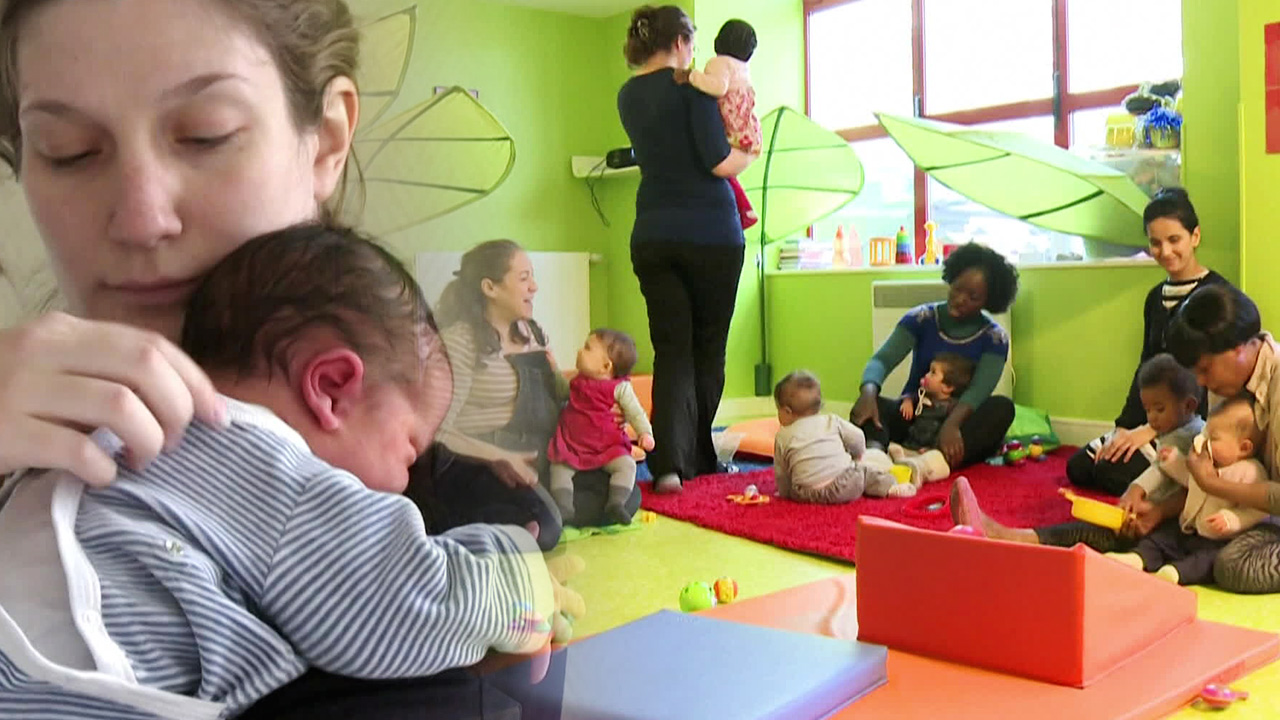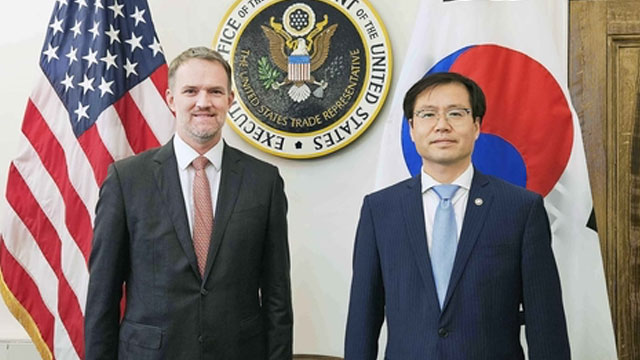France prioritizes children over traditional family structures
입력 2024.10.14 (00:45)
읽어주기 기능은 크롬기반의
브라우저에서만 사용하실 수 있습니다.
[Anchor]
In France, the birth rate among unmarried couples is so high that 6 out of 10 newborns are born to single women.
Reflecting this reality, since three years ago, unmarried women have been able to receive government support for infertility treatments.
This is reporter Ahn Da-young from Paris.
[Report]
The French government agency overseeing infertility treatments has launched a campaign urging sperm and egg donations.
The campaign, titled "Let's Make Parents," is spreading across France.
Consultations are also being held with those willing to donate.
[Marie Lehois/Egg Donor: "I want to give people the joy of becoming parents and the possibility of bringing a child into the world."]
Not only married couples experiencing infertility but also unmarried cohabiting couples can receive donations.
Additionally, a law amendment in 2021 allows unmarried women to receive sperm donations and gives them access to related health insurance benefits.
Artificial insemination is fully covered by the state for up to six attempts, and in vitro fertilization is covered for up to four attempts.
There is a significant recognition that anyone should be able to have and raise children, regardless of traditional family structures through marriage.
[Medi Benchayeb/Public Health Center Doctor: "It is estimated that every year, 1,000 to 2,000 children are born in France through (sperm or egg) donations. The demand for sperm donations has increased by 5 to 7 times, and the demand for egg donations has increased by 4 times."]
France, which boasts the highest birth rate in Europe, sees unmarried births as common.
It ranks second among OECD member countries, with 6 out of 10 births from unmarried parents.
Recently, as the birth rate in France has slightly declined, the government proactively announced measures to expand support for infertility treatments.
[Emmanuel Macron/French President/January New Year Press Conference: "Both men and women are experiencing a sharp increase in infertility, causing many couples to suffer. A major plan for demographic rearmament is set to begin."]
Many countries around the world are starting to find solutions to low birth rates by recognizing various types of families.
This is Ahn Da-young reporting for KBS News from Paris.
In France, the birth rate among unmarried couples is so high that 6 out of 10 newborns are born to single women.
Reflecting this reality, since three years ago, unmarried women have been able to receive government support for infertility treatments.
This is reporter Ahn Da-young from Paris.
[Report]
The French government agency overseeing infertility treatments has launched a campaign urging sperm and egg donations.
The campaign, titled "Let's Make Parents," is spreading across France.
Consultations are also being held with those willing to donate.
[Marie Lehois/Egg Donor: "I want to give people the joy of becoming parents and the possibility of bringing a child into the world."]
Not only married couples experiencing infertility but also unmarried cohabiting couples can receive donations.
Additionally, a law amendment in 2021 allows unmarried women to receive sperm donations and gives them access to related health insurance benefits.
Artificial insemination is fully covered by the state for up to six attempts, and in vitro fertilization is covered for up to four attempts.
There is a significant recognition that anyone should be able to have and raise children, regardless of traditional family structures through marriage.
[Medi Benchayeb/Public Health Center Doctor: "It is estimated that every year, 1,000 to 2,000 children are born in France through (sperm or egg) donations. The demand for sperm donations has increased by 5 to 7 times, and the demand for egg donations has increased by 4 times."]
France, which boasts the highest birth rate in Europe, sees unmarried births as common.
It ranks second among OECD member countries, with 6 out of 10 births from unmarried parents.
Recently, as the birth rate in France has slightly declined, the government proactively announced measures to expand support for infertility treatments.
[Emmanuel Macron/French President/January New Year Press Conference: "Both men and women are experiencing a sharp increase in infertility, causing many couples to suffer. A major plan for demographic rearmament is set to begin."]
Many countries around the world are starting to find solutions to low birth rates by recognizing various types of families.
This is Ahn Da-young reporting for KBS News from Paris.
■ 제보하기
▷ 카카오톡 : 'KBS제보' 검색, 채널 추가
▷ 전화 : 02-781-1234, 4444
▷ 이메일 : kbs1234@kbs.co.kr
▷ 유튜브, 네이버, 카카오에서도 KBS뉴스를 구독해주세요!
- France prioritizes children over traditional family structures
-
- 입력 2024-10-14 00:45:23

[Anchor]
In France, the birth rate among unmarried couples is so high that 6 out of 10 newborns are born to single women.
Reflecting this reality, since three years ago, unmarried women have been able to receive government support for infertility treatments.
This is reporter Ahn Da-young from Paris.
[Report]
The French government agency overseeing infertility treatments has launched a campaign urging sperm and egg donations.
The campaign, titled "Let's Make Parents," is spreading across France.
Consultations are also being held with those willing to donate.
[Marie Lehois/Egg Donor: "I want to give people the joy of becoming parents and the possibility of bringing a child into the world."]
Not only married couples experiencing infertility but also unmarried cohabiting couples can receive donations.
Additionally, a law amendment in 2021 allows unmarried women to receive sperm donations and gives them access to related health insurance benefits.
Artificial insemination is fully covered by the state for up to six attempts, and in vitro fertilization is covered for up to four attempts.
There is a significant recognition that anyone should be able to have and raise children, regardless of traditional family structures through marriage.
[Medi Benchayeb/Public Health Center Doctor: "It is estimated that every year, 1,000 to 2,000 children are born in France through (sperm or egg) donations. The demand for sperm donations has increased by 5 to 7 times, and the demand for egg donations has increased by 4 times."]
France, which boasts the highest birth rate in Europe, sees unmarried births as common.
It ranks second among OECD member countries, with 6 out of 10 births from unmarried parents.
Recently, as the birth rate in France has slightly declined, the government proactively announced measures to expand support for infertility treatments.
[Emmanuel Macron/French President/January New Year Press Conference: "Both men and women are experiencing a sharp increase in infertility, causing many couples to suffer. A major plan for demographic rearmament is set to begin."]
Many countries around the world are starting to find solutions to low birth rates by recognizing various types of families.
This is Ahn Da-young reporting for KBS News from Paris.
In France, the birth rate among unmarried couples is so high that 6 out of 10 newborns are born to single women.
Reflecting this reality, since three years ago, unmarried women have been able to receive government support for infertility treatments.
This is reporter Ahn Da-young from Paris.
[Report]
The French government agency overseeing infertility treatments has launched a campaign urging sperm and egg donations.
The campaign, titled "Let's Make Parents," is spreading across France.
Consultations are also being held with those willing to donate.
[Marie Lehois/Egg Donor: "I want to give people the joy of becoming parents and the possibility of bringing a child into the world."]
Not only married couples experiencing infertility but also unmarried cohabiting couples can receive donations.
Additionally, a law amendment in 2021 allows unmarried women to receive sperm donations and gives them access to related health insurance benefits.
Artificial insemination is fully covered by the state for up to six attempts, and in vitro fertilization is covered for up to four attempts.
There is a significant recognition that anyone should be able to have and raise children, regardless of traditional family structures through marriage.
[Medi Benchayeb/Public Health Center Doctor: "It is estimated that every year, 1,000 to 2,000 children are born in France through (sperm or egg) donations. The demand for sperm donations has increased by 5 to 7 times, and the demand for egg donations has increased by 4 times."]
France, which boasts the highest birth rate in Europe, sees unmarried births as common.
It ranks second among OECD member countries, with 6 out of 10 births from unmarried parents.
Recently, as the birth rate in France has slightly declined, the government proactively announced measures to expand support for infertility treatments.
[Emmanuel Macron/French President/January New Year Press Conference: "Both men and women are experiencing a sharp increase in infertility, causing many couples to suffer. A major plan for demographic rearmament is set to begin."]
Many countries around the world are starting to find solutions to low birth rates by recognizing various types of families.
This is Ahn Da-young reporting for KBS News from Paris.
-
-

안다영 기자 browneyes@kbs.co.kr
안다영 기자의 기사 모음
-
이 기사가 좋으셨다면
-
좋아요
0
-
응원해요
0
-
후속 원해요
0















이 기사에 대한 의견을 남겨주세요.